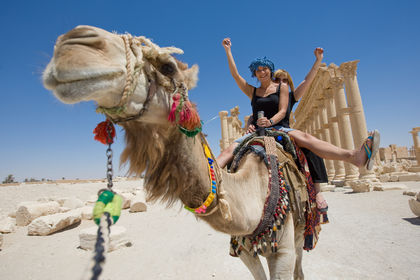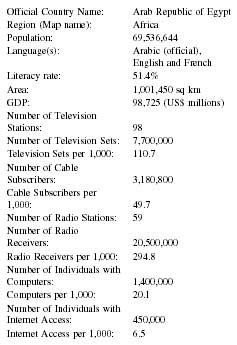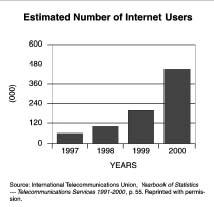Egypt

Basic Data

| Official Country Name: | Arab Republic of Egypt |
| Region (Map name): | Africa |
| Population: | 69,536,644 |
| Language(s): | Arabic (official), English and French |
| Literacy rate: | 51.4% |
| Area: | 1,001,450 sq km |
| GDP: | 98,725 (US$ millions) |
| Number of Television Stations: | 98 |
| Number of Television Sets: | 7,700,000 |
| Television Sets per 1,000: | 110.7 |
| Number of Cable Subscribers: | 3,180,800 |
| Cable Subscribers per 1,000: | 49.7 |
| Number of Radio Stations: | 59 |
| Number of Radio Receivers: | 20,500,000 |
| Radio Receivers per 1,000: | 294.8 |
| Number of Individuals with Computers: | 1,400,000 |
| Computers per 1,000: | 20.1 |
| Number of Individuals with Internet Access: | 450,000 |
| Internet Access per 1,000: | 6.5 |
Background & General Characteristics
Egypt is one of the most pivotal of the nations of the western nations called the Middle East, which is actually an incorrect term, but is more popularly recognized by journalists and the media. It is pivotal because it is in the heart of a realm that extends over 6,000 miles longitudinally and 4,000 miles in latitude. The placement of Egypt in this realm is even more important because it is the most stable country in this region—economically, socially, culturally, and as a tourist destination.
The population of nearly 70 million Egyptians is 94 percent Muslim with the primary ethnic group being Eastern Hamitic stock (Egyptians, Bedouins, and Berbers). Only half of Egypt's citizens are literate with less than 40 percent of that number being women.
Egypt is home to the Nile River. It is by the northern end of the Red Sea, the eastern end of the Mediterranean Sea, and located in the northeastern corner of Africa across from Turkey to the north and Saudi Arabia to the east, adjacent to Israel, Islamic Sudan and militant Libya. Egypt's geographic location could condemn it, but it does not. Egypt has played host to a variety of frequent conferences, meetings and discussions that are held in Cairo, Egypt's capitol, to discuss what needs to be done to create peace in Southwest Asia, a more appropriate title for "the Middle East." However, Egypt still controls the stability in the region and therefore commands a good deal of media attention.
In the fifth century BCE (BC), the Greek scholar Herodotus described Egypt as the "gift of the Nile," but Egypt was also a product of natural protection in the ancient world. The Egyptian civilization was indeed the gift of the Nile, but the Nile itself produced a gift each year when it flooded; it deposited good, fertile soil that could grow crops that Egypt could trade. The Nile was navigable, and therefore the Nile River has been a source of life for Egypt to this day. However, control of the water is a topic that can be found in the state-controlled press of Egypt and throughout the world.
Egypt's medial landscape is defined with a simple question: for or against. Over the past few years, the system has increasingly been challenged by a growing generation of independent publications. Loyal to the idea of investigative journalism and providing information not framed by specific party lines, there are currently over 200 independent media sources in Egypt today; most of them are published off shore and brought back into the Egyptian state. Most of Egypt's media is government owned through the State Information Service of Egypt. Printed media can be divided into four categories: state owned, party owned, domestic licensed independent, and foreign licensed independent. Therefore, printed media is generally overseen by the state in Egypt and is considered not to be free; again, the State Information Service would see a great deal of what is in print in Egypt.
News Media
Overall there are 18 primary newspapers and periodicals within Egypt. Some of these include:
- Akhbar al-Adab .
- Akher Sa'a .
- Al-Ahali .
- Al-Ahram al-Arabit
- Al-Ahram Hebdo
- Al-Gumhuriya
- Al-Shaab
The Egyptian government owns a controlling stock in three major daily Egyptian newspapers: Al-Ahram, Al-Akhbar, and Al-Gumhuriya . The editors of these dailies are appointed by the president, and as appointees, they enjoy little censorship by the government. But because they are appointed and working in a state-owned newspaper, it is understood that their loyalties remain with the state. They are also given substantial leeway, given they avoid certain "taboos"—meaning government criticism is avoided since it selects and compensates them. The largest of these newspapers is the Al-Ahram , and it is the largest Arabic newspaper in the world; the Al Ahram Regional Press Institute has now been established, which helps Egyptian and Arabic journalists learn more current trends in journalism as well as graphic arts and legal issues associated with this practice, according to the International Journalists' Network.
Party-owned media, until recently the only true competitor for state-owned media, was the Party Press whose leaders also enjoyed limited censorship. Fourteen of Egypt's political parties have the right to publish their own newspapers, receiving a small subsidy from the government and sometimes receiving foreign interest as well. However, if they are receiving small subsidies and they enjoy very little censorship, again state domination has made its presence well known. Most party newspapers are weekly, although the main opposition, parties Al-Wafd and Al-Ahrar , maintain dailies. Al-Shaab , an Islamic-oriented Socialist labor party, maintains a semi-weekly publication.
Domestic-licensed independents are very rarely licensed in Egypt; hence, there are very few newspapers which fit into this category. Part of that rarity is due to the fact that it is extremely expensive and one must be cleared by all main security and intelligence agencies in order to receive a state licensure. Here again the State Information Service has control. Most of these publications are rare and done off shore, so domestic independents are few and far between. With education being questionable at best in Egypt, what specific audiences those publications would reach remains uncertain.
Offshore independents often circumvent certain constitutional rules, such as the restriction of the establishment of newspapers to legal entities, corporate bodies or political parties; many Egyptian-owned publications register in other nearby countries. Over 200 titles register abroad, mostly in Cyprus, and bring their publications back into Egyptian borders. Many owners seek licensure to print within the country, but it is too expensive and too

Nearly all magazines and newspapers are printed by one of seven government-owned printing houses. It is believed the government uses its control of the region's publishing to limit the output, access, and influence of opposition groups observable by the International Journalists' Network. They seem to be very clear in establishing an overview of the Egyptian press. If one looks at the overall picture, the Egyptian press is very state-controlled. The retention of three laws makes it increasingly easier for the government to find fault with the offshore publications. The press law, the publications law, and the penal code govern press issues and stipulate fines or imprisonment for criticizing the president, members of the government, or any foreign head of state. If the government finds something ambiguous, or if it does not screen through security properly, these media laws make it difficult for anything to bypass government screening.
Broadcast & ELECTRONIC News Media
Egyptians own over 20 million radios and nearly 8 million televisions. There are 98 television stations and 42 AM and 14 FM radio stations. The Egyptian Radio and Television Union (ERTU) works in affiliation with the Ministry of Information to operate all eight government-owned TV stations in Egypt, as well as two satellite stations and 19 local and regional stations. Egypt launched NileSat, the Arab world's first broadcast satellite, to carry Egyptian TV and radio from North Africa to the Persian Gulf.
NileSat is helping stimulate change in the area. Women are interested in seeing how other women are dressed on TV. Muslim women—who were traditionally "covered up" with their clothing—are now moving toward a modern, "western"—namely American—style of dress. The media has influenced the women's movement, but the Egyptian government, oddly enough, is not censoring them on this issue.
In November 2001 a second privately-owned satellite network was also launched called DreamTV.
Egypt has made relatively good progress in making Internet access available to its people, particularly in comparison to other African countries. There are 50 Internet service providers for about 300,000 users who are able to view many of the country's newspapers online.
Bibliography
The Central Intelligence Agency (CIA). World Factbook 2001 . Directorate of Intelligence, 2002. Available from http://www.cia.gov .
Committee to Protect Journalists. Middle East and North Africa Country Report: Egypt . 2001. Available from http://www.cpj.org/attacks01/mideast01/Egypt.html .
De Blij, H.J., and Peter O. Muller. Geography: Realms, Regions and Concepts . New York: John Wiley and Sons, 2002.
"Egypt." BBC News. Available from http://news.bbc.co.uk .
IJNet: International Journalists' Network. Available from http://www.ijnet.org/Profle/Africa/Egypt/media.html .
"The Press in Egypt." Available from http://www.sis.gov.eg/pressrev/html/pressinfo.htm .
Pamela M. Gross